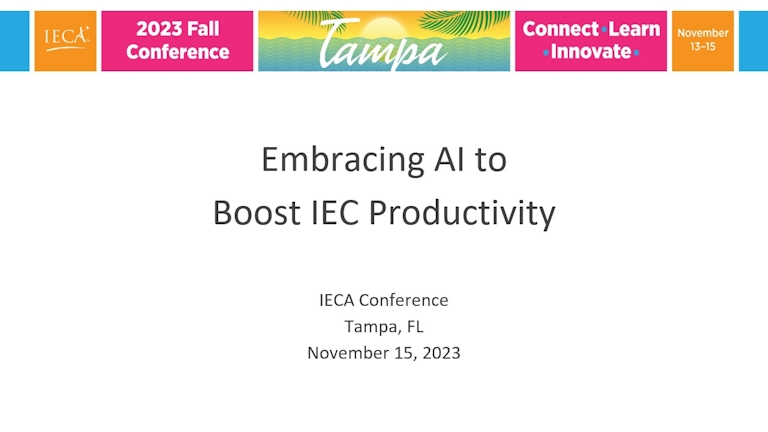Key Takeaways and Recommendations
- Learn by Doing: The panel universally agreed that the best approach to understanding AI’s capabilities is just try it! Actively engaging with tools like ChatGPT for ~30 minutes can unlock tremendous learning. Focus on one specific use case, and just try it! If you take one thing away from this article, this is it 🙂
- Leverage Cross-Industry Inspiration: Learning from AI applications in different fields can spark innovative uses in the IEC field. We are all learning in real-time, and learning from others with an open mind will be of paramount importance.
- Lean on the Community: Ask questions, and Share, share, and share! With the rapid evolution of AI, sharing resources within the IEC community will be crucial to stay informed.
Panel Highlights
Belinda’s Integration of AI into her IEC Practice: Belinda shared her first-hand experience with AI in her IEC practice. She showcased AI’s versatility, from creating interactive photo scavenger hunts for college visit tours to drafting scripts for her video series to aiding in personal tasks like formulating packing lists. She highlighted that she actively looks for ways to leverage AI to help her, and simply explores its potential.
Jack’s How to Think about AI Use Cases: Jack outlined exactly where AI can be powerful. He focused on three main categories. (1) Summarization (taking a lot of text and boiling it down), (2) Analysis (deepening understanding or taking a lot of data and generating insights), and (3) Idea generation or expansion (taking a little text and expanding or augmenting it).
Francine’s Easy way to Test out AI: Francine highlighted how AI tools like ChatGPT can adjust the tone of communication, catering to specific emotional contexts. If you are struggling to make a message humble, encouraging, or something else, AI can help find the words when you just can’t crack the code.
Below, you will find other invaluable insights from the panel.
Communication around AI
Communication with Students/Families: When asked about how Belinda has communicated with her students about AI, she told us that she is not the AI police. She proactively shares resources to help clients stay informed, but ultimately, the students must learn about and adhere to policies set forth by schools. She sets expectations clearly that transparency and honesty are paramount.
Asking Questions to Admissions Offices: Francine shared guidance on how to approach talking about AI with college admissions offices: Focus on the past or present, not the future. Asking about what someone might do in the future is going to be futile because they do not know yet. Staying focused on the present puts you in the best position to gather the information that you need to guide your families effectively.
AI Workouts
Pitfalls of AI detectors: Francine shared a personal story about the pitfalls of AI “detectors”. She put in text from her textbook (written before Gen-AI tools existed) as well as text that was generated using ChatGPT on the same topic. AI detectors projected the same likelihood of being written by AI (52% and 51% respectively) for both texts. Confusing huh?
AI is like an over-eager Intern: We discussed an analogy about AI being like an intern – very eager to help, to work hard, and to work quickly, but it is important to double check the work and put your critical thinking cap on when assessing the output it produces.
Avoiding Hallucinations: Jack shared an interesting perspective on hallucinations: “AI models will try to respond to our questions, even if they do not know the answer. They can be completely wrong, but come across very confidently, and extremely convincing.” Jack shared advice on avoiding hallucinations by giving “the machine a way out.” In your prompts, you can say: “if you don’t know this, that is okay, just let me know.”
Thank you!
Lastly, we wanted to say a sincere thank you to our audience members. We appreciated your engagement and thoughtful questions around best ways to get started, how to stay up to date on the changes, and specific tactics to leverage AI for certain tasks. Reach out to continue the conversation or learn more!

About the Panelists:
- Dr. Belinda Wilkerson: Past IECA Board Member, College and Career Counselor, Adjunct Professor at Providence College.
- Dr. Francine Fabricant: Career Counselor and Learning and Development Expert with a dissertation focus on AI, automation, and continuous learning.
- Jack O-Brien: CEO and Founder of LowTech AI, focusing on democratizing AI education with simple tools for everyone.
- Moderated by Aaron Lewin: Co-founder of Soundboard and son of a practicing IEC/college counselor, aiming to simplify work for IECs.
Valuable AI Resources for IECs
- LowTech AI’s specific tools for IECs in need of help with prompting.
- Soundboard leverages AI to facilitate day-to-day IEC tasks.
- AI tools like Chat GPT and Bard – just try it!
- Belinda’s key people to watch: Rich Clark (Admissions @ Georgia Tech) and Lance Eaton (College Unbound)

